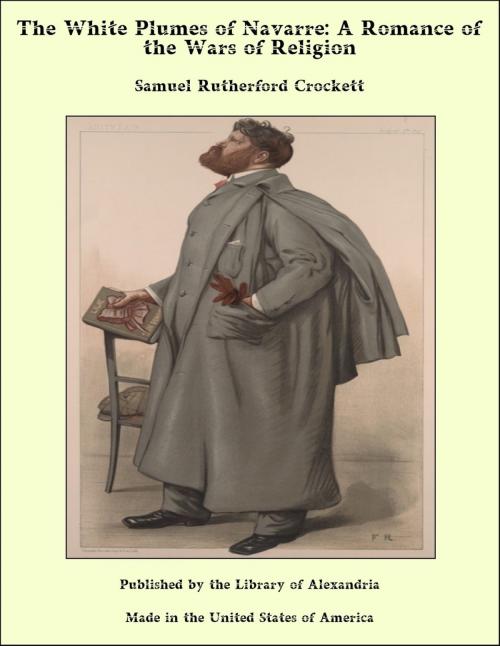The White Plumes of Navarre A Romance of The Wars of Religion
Nonfiction, Religion & Spirituality, New Age, History, Fiction & Literature| Author: | Samuel Rutherford Crockett | ISBN: | 9781613105986 |
| Publisher: | Library of Alexandria | Publication: | March 8, 2015 |
| Imprint: | Language: | English |
| Author: | Samuel Rutherford Crockett |
| ISBN: | 9781613105986 |
| Publisher: | Library of Alexandria |
| Publication: | March 8, 2015 |
| Imprint: | |
| Language: | English |
A noise of guns crashed, spat, and roared beneath the window which gave on to the narrow street. Professor Anatole rose hastily and went to the casement, worried a moment with the bar-fastening (for the window on that side was never unhasped), opened it, and looked forth. Little darting, shifting groups of lads in their dingy student cloaks, were defending themselves as best they might against a detachment of the King's Royal Swiss, who, on the march from one part of the city to another, had been surprised at the head of the narrow Street of the University. An old man had somehow been knocked down. His companion, a slim youth in a long, black cape, knelt and tried to hold up the failing head. The white beard, streaked with dark stains, lay across his knees. Now the Professor of Eloquence, though he lectured by preference concerning the virtues of peace, thought that there were limits even to these; so, grasping his staff, which had a sword concealed in the handle, of cunning Venice work, ran downstairs, and so found himself out on the street. In that short period all was changed. The Royal Swiss had moved on. The battling clerks had also vanished. The narrow Street of the University was blank save for the old man who lay there wounded on the little, knobbed cobble-stones, and the slim, cloaked youth bending over him. Professor Anatole does not remember clearly what followed. Certain it is that he and the lad must have carried the wounded man up the narrow stair. For when Anatole came a little to himself they were, all the three of them, in his wide, bare attiring-chamber, from which it was his custom to issue forth, gowned and solemn, in the midst of an admiring hush, with the roll of his daily lecture clasped in his right hand, while he upheld the long and troublesome academic skirts with the other. But now, all suddenly, among these familiar cupboards and books of reference, he found himself with a dying man—or rather, as it seemed, a man already dead. And, what troubled him far more, with a lad whose long hair, becoming loosened, floated down upon his shoulders, while he wept long and continuously, "Oh—oh—oh—my father!" sobbing from the top of his throat. Now Professor Anatole was a wise man, a philosopher even. It was the day of mignons. The word was invented then. King Henry III. had always half-a-dozen or so, not counting D'Epernon and La Joyeuse. That might account for the long hair. But even a mignon would not have cried "Ah—ah—ah!" in quick, rending sobs from the chest and diaphragm.
A noise of guns crashed, spat, and roared beneath the window which gave on to the narrow street. Professor Anatole rose hastily and went to the casement, worried a moment with the bar-fastening (for the window on that side was never unhasped), opened it, and looked forth. Little darting, shifting groups of lads in their dingy student cloaks, were defending themselves as best they might against a detachment of the King's Royal Swiss, who, on the march from one part of the city to another, had been surprised at the head of the narrow Street of the University. An old man had somehow been knocked down. His companion, a slim youth in a long, black cape, knelt and tried to hold up the failing head. The white beard, streaked with dark stains, lay across his knees. Now the Professor of Eloquence, though he lectured by preference concerning the virtues of peace, thought that there were limits even to these; so, grasping his staff, which had a sword concealed in the handle, of cunning Venice work, ran downstairs, and so found himself out on the street. In that short period all was changed. The Royal Swiss had moved on. The battling clerks had also vanished. The narrow Street of the University was blank save for the old man who lay there wounded on the little, knobbed cobble-stones, and the slim, cloaked youth bending over him. Professor Anatole does not remember clearly what followed. Certain it is that he and the lad must have carried the wounded man up the narrow stair. For when Anatole came a little to himself they were, all the three of them, in his wide, bare attiring-chamber, from which it was his custom to issue forth, gowned and solemn, in the midst of an admiring hush, with the roll of his daily lecture clasped in his right hand, while he upheld the long and troublesome academic skirts with the other. But now, all suddenly, among these familiar cupboards and books of reference, he found himself with a dying man—or rather, as it seemed, a man already dead. And, what troubled him far more, with a lad whose long hair, becoming loosened, floated down upon his shoulders, while he wept long and continuously, "Oh—oh—oh—my father!" sobbing from the top of his throat. Now Professor Anatole was a wise man, a philosopher even. It was the day of mignons. The word was invented then. King Henry III. had always half-a-dozen or so, not counting D'Epernon and La Joyeuse. That might account for the long hair. But even a mignon would not have cried "Ah—ah—ah!" in quick, rending sobs from the chest and diaphragm.















